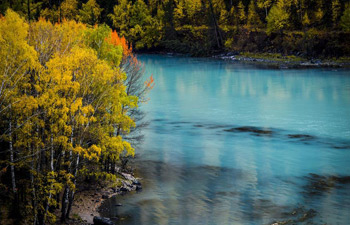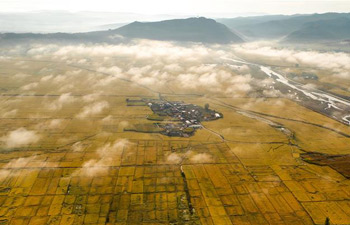By Peter Mertz
DENVER, the United States, Sept. 23 (Xinhua) -- A small team of environmental scientists in the U.S. state of Montana reignited a fiery national debate over global warming this week.
Three thousand miles (4,600 milometers) away, America's southeast was still submerged after a series of devastating hurricanes, but scientists living in the country's northwest were connecting the dots and claiming that signs of global warming were sweeping from coast to coast.
In 2017, Montana and Pacific Coast state Oregon had their worst wildfire seasons on record, with Montana losing one million acres (4,047 square kilometers) of land, according to Inciweb, an inter-agency all-risk incident online information management system provided by the United States Forest Service.
At the same time, heat records have been set or matched across much of the western states. In Los Angeles, a 131-year-old heat record in downtown fell in August and one month later the city had to fight with the largest fire by acreage in history.
"Between 1950 and 2015, Montana saw an average two-to-three degree (Fahrenheit) increase in temperature," said Montana climatologist Kelsey Jensco.
"That's double what the United States as a whole has seen," Jensco said, noting that the worst news dealt with future weather predictions.
"The climate model suggests an additional 4-6 degrees (Fahrenheit) by the end of the century," Jensco's co-author Cathy Whitlock said.
In an exclusive interview with Xinhua on Friday, Whitlock, a University of Montana climate professor, said the entire scientific community is "100 percent in agreement that Montana is getting warmer."
"We will see more record days with temperatures in the nineties and less frost," she said, noting that snowpack will decline and extreme drought conditions are expected to continue "through the end of the century."
These startling revelations by Whitlock, along with Jensco and Nick Silverman from Montana State University, have single-handedly catapulted the climate change debate from East to West overnight.
Last week, the renowned Aspen Institute called for Congress to reverse President Donald Trump from retreating on hurricane-proof building standards announced just before Hurricane Harvey hit Texas.
"Extreme weather, like floods and hurricanes as well as other natural disasters exacerbated by climate change, will continue to occur more frequently and with little warning," the Institute warned on its website, calling for stricter construction codes in the wake of more anticipated disasters.
The Montana study, from America's topographically diverse and fourth largest state, is particularly alarming because it is considered a "very cold state," Whitlock noted.
Montana shares 600 miles (960 kilometers) of border with three Canadian provinces in America's northwest.
The study comes on the heels of two weeks of similar climate change concerns aired by environmental groups after America's southwest was slammed by a series of devastating hurricanes.
In late August, Hurricane Harvey set the record for most rainfall dropped by a storm and was the first to hit the mainland since 2005 when it drenched south Texas.
A month later, Cape Verde-type Hurricane Irma became the first Category 5 hurricane to hit southern Florida, and last week Category 4 Maria left the entire island of Puerto Rico without power.
The term global warming was coined by a Columbia University professor in a 1975 report in Science Magazine that predicted the climactic changes that have since occurred.
Wally Broecker, now 85, has watched his observation mushroom into a global movement adopted by virtually every scientist on Earth who agrees that greenhouse gases have contributed to temperature rises across the planet.
Global warming means surface temperatures from 1880 to 2016, that scientists have carefully measured, show an increase in the Earth's average surface temperature by almost 1°C.
For 2,000 years before 1850, historical climate studies show the Earth's temperature to have been relatively stable, according to a number of studies.
However, since the age of industrialization began in Great Britain in the 1800s, the median surface temperatures across the planet have skyrocketed, according to virtually every scientist in the world.
In 1998, President Bill Clinton signed the Kyoto protocol, an agreement adopted by 192 countries to reduce harmful greenhouse gas emissions.
The next American president, George W. Bush, a conservative, oilman, said he opposed the protocol because it "would cause serious harm to the U.S. economy."
"Bush's policy reversal received a massive wave of criticism from the international media and all the world leaders including China, Japan, and South Africa, who expressed their disappointment," the Tyndall Center for climate change research said at the time.
In 2012, four years after Bush had left office, the United States experienced its warmest year on record.
As of 2012, the 13 warmest years for the entire planet have all occurred since 1998, transcending those from 1880, according to the National Oceanic and Atmospheric Administration (NOAA).
Since the 1970s, U.S. oil companies, some of the wealthiest corporations in the country, knew that burning oil and gas could cause global warming, but they spent millions on advertising denying this potential pitfall, a 2015 New York Times article stated.
Nationally famous TV celebrity Bill Nye, a friend of President Barack Obama's who is credited with ushering in the 21st century "science-revival," did not mince words this week.
After United States Environmental Protection Agency (EPA) chief Scott Pruit declined to discuss global warming in the wake of hurricanes Harvey and Irma, Nye told a TV audience, "Scott Pruitt is wrong, now is the time to talk climate change."
2016 was a historic year for billion-dollar weather and climate disasters in the U.S., and 2017 will eclipse that.
"One of the measurable impacts from increased build up of greenhouse gases in the atmosphere over the past century is the rise in the global average temperature," said the National Oceanic and Atmospheric Administration (NOAA) Atlantic Hurricane Season Outlook, 2017.
"The result is higher numbers of tropical storms, hurricanes, and major hurricanes, and these systems tend to last longer than in near-normal or below-normal seasons," the NOAA said.
Friday, two days after the Montana study was released, the Fox News network aired results of a four-year-old study suggesting that global warming had in fact slowed.
"The computers were wrong. There's still hope for Planet Earth," the report said.
Published in the journal Nature Geoscience, the report relied on 2012 information that was questioned by the Montana scientists due to subsequent research showing underwater ocean temperatures had affected the results.
















